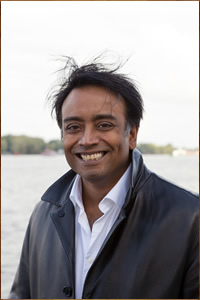De Britse schrijver Zia Haider Rahman werd in 1969 geboren op het platteland van Bangladesh in de regio Sylhet. Zie ook alle tags voor Zia Haider Rahman op dit blog.
Uit: In the Light of What We Know
“I had not heard the name of the twentieth-century Austrian-American mathematician Kurt Gödel since a July weekend in New York, in the early 1990s, when I was visiting from London for a month of induction at the head offices of an investment bank into which I had recently been recruited. In some part I owe my recruitment to the firm, of which I later became a partner, to Zafar, who was already a derivatives trader in the bank’s Wall Street offices and who had quickly established a reputation as a bright though erratic financial wizard.
Like Zafar, I was a student of mathematics at Oxford, but that, to put it imprecisely, was the beginning and the end of what we had in common. Mine was a privileged background. My father was born into a well-known landed family in Pakistan, where he met and married my mother. From there, the newly-weds went to Princeton, where they had me, making me an American citizen, and where my father obtained his doctorate before moving to Oxford so that he could take up a chair in physics. I am no genius and I know that without the best English schooling, I would not have been able to make as much as I have of the opportunities that came my way.
Zafar, however, arrived at Oxford in 1987 with a peculiar education, largely cobbled together by his own efforts, having been bored, when not bullied, out of one school after another. His family moved to Britain when he was no more than five years old, but then, at the age of twelve, or ten, by the new reckoning, he returned from Britain to rural Bangladesh for an interval of some years.
To him, Oxford must have seemed, as the expression goes, a long way to come. In our first term there, as we lounged in the Junior Common Room beside windows that gave out onto the garden quad, I observed that Zafar’s pronunciation of the names of various Continental mathematicians – Lebesgue, Gauss, Cauchy, Legendre, and Euler – was grotesquely inaccurate. Though my first reaction, I am a little ashamed to say, was to find this rather amusing, I soon grasped that Zafar’s errors marked his learning as his own, unlike mine, which carried the imprint of excellent schoolmasters. I must confess to a certain envy at the time.”

Zia Haider Rahman (Sylhet, 1969)

